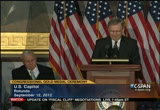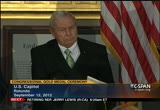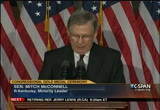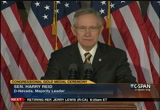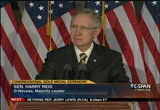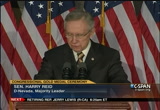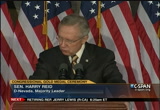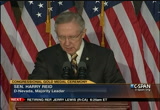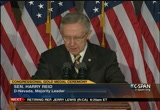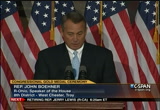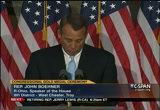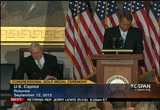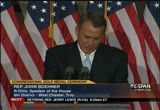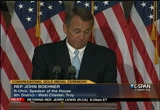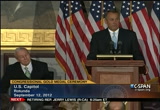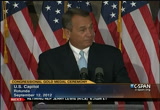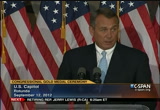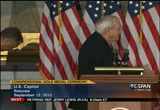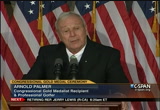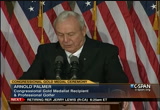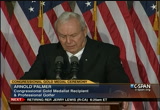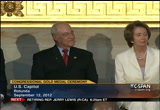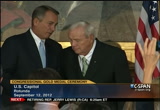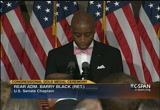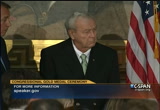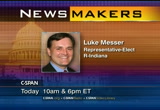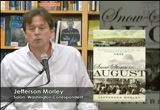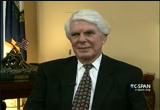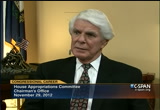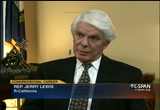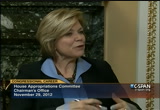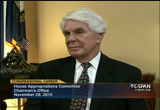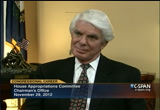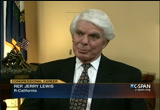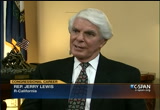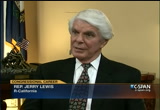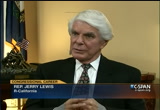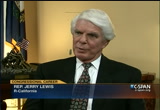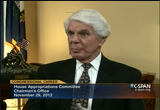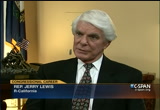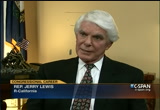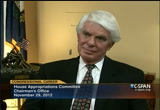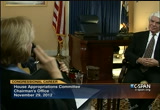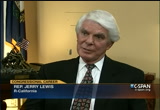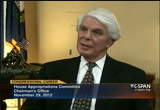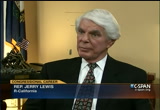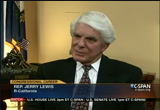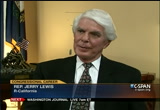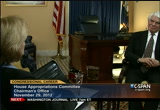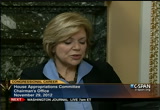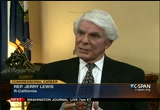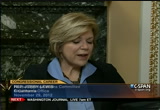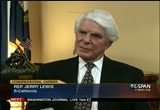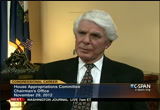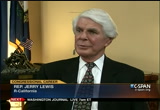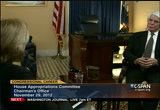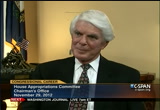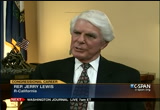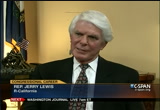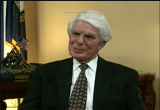tv Washington This Week CSPAN December 30, 2012 6:00am-7:00am EST
6:00 am
different from other golfers. he engaged the crowd. he brought them into the trauma of the sport. and they loved him for it -- drama of the sport. and they loved him for it. when he played poorly or missed when he won, they won. in the early 1960's were arnold palmer's most prolific years. during one stretch from 1960 to 1964, he won six majors. over the next several decades, arnold palmer became a national icon. he left an indelible mark on the sport of golf. and through the highs and lows of his long career, arnie's army was always by his side.
6:01 am
many remember the emotional scene that played out as arnold took his final walk up the 18th fairway during his 50th consecutive and final masters appearance in april 2004. there they were, once again. since then, arnold palmer has never stopped giving. he has continued to help, heel, and inspire. he remained as committed to others as ever. today, we honor this good man. he has done so much. not just to mainstream the sport of golf, but he has used his fame to serve others. arnold palmer, for your great contributions to the game of golf, but mostly for your lifetime of service, congress
6:02 am
recognizes you today with our nation's highest civilian honor. congratulations, palmer,. -- arnold palmer. [applause] >> ladies and gentlemen, the majority leader of the united states senate, the honorable harry reid. [applause] >> as an 18 or 19-year-old young man, i came to the realization i was not going to be the athlete of my dreams. i was not big enough, fast enough, or good enough. but i still have those dreams. i get up every morning, with all the things the we do here,
6:03 am
unemployment, energy problems -- when i get up in the morning, i get "the new york times," and the first place i go is the sports page. for a few minutes every morning, i dream of the athlete that i wanted to be. [laughter] and as i have dreamed over the decades, i thought, wouldn't it be great to be able to meet a babe ruth or lou gehrig? or maybe a rocky marciano? joe frazier?
6:04 am
but today, i have been able to meet two of the people i have dreamed about going down to that 18th hole. with a good put, i can win this thing. this is a personal privilege for me to be able to meet the great jack nicklaus and to be here to help honor the great arnold palmer. we know that arnold palmer has played on the finest courses that the world has. he has designed 300 golf courses. seven of them are in nevada, operating now. he has won trophy after trophy after trophy. he has been swinging golf clubs since a little boy of four years old.
6:05 am
he was always such a big star. i hope, arnold, you'll remember. you and winnie were traveling across the country. they stopped a long way from las vegas to have a hamburger and some french fries and a beer. they had very little money. they certainly were not going to gamble. they did not have the resources to do that. a young married couple flipped a roulette wheel and they bet on a double eight. and it hit it. and this is what arnold palmer wrote about this stroke of luck.
6:06 am
"$35, talk about a couple of nice kids. we hustled back to our hotel room, -- naive kids. we hustled back to our hotel room. we propped a door against the hotel room -- we've brought a chair against the battelle room door. -- propped a chair against the hotel room door." in hindsight, he proudly did not need that $35 very much. but imagine how much it must have felt to a young married couple to starting out. we all know that arnold was devoted to winnie, who died of cancer in 1999. he is a family man, with two daughters. i was fortunate to be able to meet kathleen earlier today, and the three children that they have, that they share.
6:07 am
i am sure that arnold palmer would agree that being surrounded by a large and loving family is a greater price the eni trophy -- prize than any trophy. over the last half a century, arnold palmer has amassed an incredible record of wins on the golf course. he has also left his mark in charity. it is exemplary. having just been terrible situation with my wife, we're still working with that with cancer, knowing how devastating it can be, i admire what he has done on the golf course. admire what you have done off the golf course. golf may be famous, but your tireless efforts -- gulf made you famous, but your tireless efforts will make you immortal.
6:08 am
congratulations on this highest honor we can bestow on anyone. we do it today to arnold palmer. [applause] >> ladies and gentleman, the speaker of united states house of representatives, the honorable john boehner. [applause] >> good morning, everyone. welcome, my colleagues, the leaders and the two chambers and my colleagues from the house and senate.
6:09 am
certainly arnold and his family and friends. jack and barbara nicklaus, and fellow golfers here and around the world. arnie, i'm going to tell a couple of golf stories and we'll get around to giving you the gold medal. what makes this metal unique is that any american can win it. whether it be a general, an artist, and astronauts, or an athlete. you can start out selling paint and end up receiving congress's highest honor. not bad for an honest they's work. throughout his life, he's been a model of integrity, passion, and commitment. these are the attributes of a
6:10 am
great golfer, and a great american. arne will tell you, it has never been about winning. he won the amateur championship back in 1964. that turning point, as he called it. there was something about the way he walked, attack the ball. asked about that, arnie said, everyone wants to win, but i did not want to lose. i just could not lose. that drove me harder than anything. someone who understands -- as someone who understands, we have got something there in common. it just so happens that last friday i was at the detroit
6:11 am
country club, where that turning point occurred in 1954. i met an 82-year-old young lady who was one of the first people in arnie's army. we saw the same kind of determination during the final round of the 1964 masters tournament, when arnie had the lead going into the 15th hole, par 5. there is a little pond in front of the 15th. it is not that big of a pond. arnie had the lead, but like anyone else, he decided not to play it safe. he decides to go for the green in two. so the kids that shot with his trademark, in-your-face swing. -- so he takes that shot with his trademark, in-your-face swing. that refusal to quit, refusal
6:12 am
to let up, give them hell of spirit is why people always like to watch him. arnie repay is in kind, through gestures as humble as a handshake. arnie is so involved in so many different associations and organizations that bob hope would often say, "arnie has so many irons in the fire that has to play the tour with his woods." he did not set out to change the game, but he did. arnold palmer democratized gulf. and made us think that we, too, could go out and play.
6:13 am
made us think that we could do anything, really. all we had to do was go out and try. my colleagues are sitting in the back. some of my colleagues about the french are betting that boehner will not make it through this. -- in the back are betting that boehner will not make it through this. [laughter] i will not tell the story today that i really wanted to, about arnold palmer and i -- arnold palmer and i, a moment we had 10 or 12 years ago. i guess i'm going to tell the story. [laughter] it was the first championship, and we were on the practice green. i had played at a little bit country club a couple of weeks before that -- latrobe country club in a couple of weeks before that.
6:14 am
i saw arnie on the practice green and told him how much i enjoyed playing at latrobe. arnie starts to talk about his dad, and what he great man was he -- what a great man he was. if it were not for his father. i got to talking about my dad. my dad owned a bar. how i would not be what i am if it were not for my father. and then arnie and i did this big bear hug and we cried our eyes out. here we were, standing in one of the most venerable places in golf. we were not there talking about golf. we were not there talking about
6:15 am
a lot of other things. the work -- we were there talking about our fathers. a famous sports writer in the early 20th-century wrote some poems, and was a great golf writer. he wrote this poem. "for when the great scorer comes to mark against your name, he writes not that you won or lost, but how you played the game." arnold, you have struck our hearts and minds. today, your government, your fellow citizens are going to strike the gold medal for you. congratulations. [applause]
6:16 am
6:17 am
[applause] >> thank you. mr. speaker, members of congress, reverend clergy, ladies and gentlemen. this is not my first time, so bear with me a little bit. i prepare this wonderful occasion, and i thought about what a thrill it was last time i had the opportunity to address congress in these halls. that was in 1990. on the 100th anniversary of the birthday of president and general dwight eisenhower. i was fortunate enough to have had a warm and rewarding french ship -- friendship with the
6:18 am
president, and the last of his years were wonderful. we enjoyed a little golf and a lot of fun. it was a great honor to be able to be with him, a great american. he was that. it was a pleasure for me to spend some time with him. i have had some feelings about this distinguished award that members of congress -- in fact, particularly proud of anything that the house and senate agree on. [applause] it is humbling to realize that just six athletes had this award, this gold medal award. roberto clemente. jackie robinson. joe louis. recently, or golfing buddy,
6:19 am
nelson. i believe that golf and golfers promotes some sort of human values that symbolize so many americans. such characteristics as honesty, hard work, dedication, responsibility, respect for the other guy, playing by the rules. it is something we do in the game of golf. these things are inherent in the game and among the cardinal principles being taught to young people throughout the country through the first tee program. they're so many people like to
6:20 am
think today. for the lack of time, i will pass on that, thank you very much. first, without the efforts of my golfing buddy and friend, joe. he is a great guy and a good golfer. i discovered when i was playing golf with him recently at the tradition club in california, just be careful about the strokes you give him. hold back just a little. [laughter] congressman is joined by so many in these halls to make it all happen. thanks to the congressional leaders who presented this award, the speaker, minority
6:21 am
leader, and to mcconnell and reid and other members of congress here today. i hope that i can think you properly and tell you how much it means to me to accept this award. i am very humbled. fink you very much. -- thank you very much. [applause] >> ladies and gentlemen, please stand as the chaplain of united states senate gives the benediction.
6:22 am
>> let us pray. eternal father, the giver of every good and perfect gift, we put our hope in you. thank you for laudable lives, and exemplary footprints arnold daniel palmer has left in the sands of time. we are grateful for this congressional gold medal ceremony in his honor. sustained and keep him and his loved ones in all of their tomorrows, making them pour in misfortune and rich in blessings. -- poor in misfortune and rich
6:23 am
in blessings. give us wisdom, that we may know the fulfillment that comes from always giving our best. we pray in your merciful name. amen. >> ladies and gentlemen, please remain at your seat for the departure of the official party. [applause] [captioning performed by national captioning institute] [captions copyright national cable satellite corp. 2012]
6:24 am
>> to the, on "washington journal," a look at president obamas's cabinet for a second term. the guest is white house reporter, david jackson. and a look at what is next for iraq. we are joined by michael gordon. "washington journal" live at 7:00 a.m. eastern on c-span. >> today on "newsmakers," priorities in the house of representatives. >> as president obama begins his second term in office, what is
6:25 am
the most important issue he should consider in 2013? >> make a short video about your message to the president. >> it is your chance to win a grand prize of $5,000. for more information, go to studentcam.org. >> think of washington, 25 years before the civil war. what would you think? you would think that slavery was well entrenched. the black people were miserable. the whites were cruel and indifferent. that is actually not true at all. in washington, there were 30,000 people. 12,000 of them were black. the majority of black people in washington in 1830 were not slaves. out of the 12,000 black people,
6:26 am
slightly more than half for free. >> washington d.c.'s first race riots. what part did francis scott key play? sunday night at 10:00 p.m. eastern. on c-span 2's book tv. >> next, california representative jerry lewis, who is retiring at the close of being 112th congress. this is about half an hour. >> congressmen jerry lewis, you are leaving after three plus decades here. in what ways is this institution different than when you joined? >> there have been many changes. the most significant difficulty with those changes is we have
6:27 am
tended recently to more and more polarized ourselves. there is a tendency to want to paint everything in partisan terms. 90% of the issues we deal with have nothing to do with partisan politics. we are here to attempt to respond to our constituency needs in a way that reflects their priorities. the partisanship has gotten in the way of members working with each other. >> can you trace the roots of that? >> i think i can. i arrived here in 1979. one of my classmates was newt gingrich. early on, he took on as his target, the speaker jim wright. that was the beginning of some
6:28 am
of this polarization. it was a better time. since those last couple of decades, the institution has suffered from too much partisanship. >> before mr. gingrich, i would imagine he would argue the republican house members have spent decades in the wilderness and he was the one that found a way to bring them into the majority in the house. how do you balance the pluses and minuses? >> there is not any question that that effort to paint a picture of jim wright's service laid the foundation for a majority. that was a healthy thing. i do not believe it was a good thing -- we have been in that for far too long.
6:29 am
appropriations committees work is where either you spend money or you do not. ideally, you are here to work with one another to be as responsive as possible to your own constituents and taxpayers. within the committee itself, the more we can talk to each other as individuals and human beings, the better off the institution will be. >> the kinds of organizations that track members' votes, when they look at yours, saw an ad and earlier you more frequently crossed the aisle to vote with democrats. in your later service, 96% rating. is that reflective -- you tell me. did the house change? >> it is a reflection of polarization that takes place at a leadership level. party loyalty is important. but our voice can be heard in a
6:30 am
fashion that says we can work together best at the subcommittee level where we talk to each other about policy direction. it is important for members to talk to each other as human beings. >> there are many people decrying the partisanship. some who think it is great. if you think it has been a bad thing for the institution, do you see it as the foreseeable future or are there agents of change that would allow more across the aisle working together?
6:31 am
>> i feel very strongly there is really hope that we will recognize the value of talking to each other, that we will return to more bipartisanship and realizing we can best serve our own constituents by knowing there is a great middle out there that makes of america. the more we reflect the middle, the better off our committee will be and i think the service we provide will be better. >> what gives you that hope? >> a lot of people are recognizing the pathway we are on will not help. more and more members are talking with me where we discuss with one another how we can improve the place. i hear it almost every day. i encourage it. >> there are people who believe partisanship is a good thing because ideology and the direction of the country moves in the way they want. for example, people have come in with the tea party. what do you think of these hyper-partisan groups outside of the congress that attempt to
6:32 am
exert their influence? >> one of the more fascinating experience i have had involves a gathering. my first meeting a couple years ago, with tea party types. my staff was concerned about this new group. i said, give me their telephone numbers. i invited them to our session. they were there that evening to express their concern about health care being nationalized and taking over that piece of their personal life. they were not angry with congress per say, but they wanted to see us spend whatever money we could spend, without assuming every answer lies in washington. one of the best things that has ever happened to us in our work, that somehow that will of lysing missed my house, is
6:33 am
because i got elected to congress. >> talking about the appropriations process in particular, here we are with the fiscal cliff and we are in the lame-duck session, but the debt to gdp ratio for the united states has continued to arrive. there are many people who have pointed fingers. what is your response? >> there is no question the pattern in washington is to spend every dime we can collect. almost regardless. there is a view that says if a program is funded, it ought to continue to be. the appropriations committee has the responsibility of oversight to make sure we are using the dollars well. we went about reducing the appropriations. this has been over a decade ago. for every category of the president's budget within my subcommittee. we were successful.
6:34 am
the first significant step of saying, we can spend less. we do not have to spend more on every program every year. >> what about the years you held the gavel? >> the commitment we made was to pass every appropriations bill by the fourth of july break. my staff said i am crazy. it was feasible if you went about the work seriously. by the fourth of the library, guess what? all of the bills had been passed. we were able to send everyone of those bills to the president's desk. they were signed in the law with bipartisan support. that sort of work can make a difference. more voices need to be heard in support of that effort. >> my recollection would be since then, it has been
6:35 am
budgeting by continuing resolutions. >> we have done an awful lot. a lot of people do not realize we have demonstrated we can do this regular order. the more we move the committee back rather than having everything dominated in a speaker's office, the better off the congress will be. >> who loses and who gains when -- >> the existing agencies have their pipelines already clogged with money and we throw more money at it without any serious oversight. continuing resolutions are ignoring our responsibility and our goal is that we have got a job to do. to see how money is spent, and to control how it should be spent. it is time we get back to the responsibility.
6:36 am
we control the purse. the sooner we do it, the better the people will be. >> the nickname for the people who stare all the subcommittees are the cardinals. the college of cardinals. give me a bit of a backstage. it is depicted in television and movies as these very powerful individuals. the door closes and the work of washington gets done. what is it really like being a subcommittee chairman when you were chairman of the entire committee? and your role as one of the cardinals. >> i would speak directly of my work as chairman of the defense subcommittee that appropriates all the money for the national defence. one of the first things we did was to recognize with the advice and counsel of people within the military that we were on a pathway to build three different lines of tactical aircraft for the future, and a lot of money would be wasted
6:37 am
unless you got a handle on it. we dared to raise questions about the f-22, and where it might go. the company that was involved was talking about the f-22 and procurement for the first seven aircraft. when they were talking about going forward, they had not tested whether the wings were ready yet. the whole program will have fallen off a cliff if we had not insisted we go back to the drawing board and do more testing and look again. because of that, the congress being directly involved, saying they may not be right on this one, we were able to move ourselves in the direction and make sure it would be the cutting edge for decades in the future in terms of america's air strength. >> we often hear who is right and who is to blame for the wasteful spending. some programs the military does not want continued to be funded
6:38 am
because they have jobs. how does the public get their money's worth, money spent most effectively, the way this system works? >> it is important for us to know the department of defense is not always right. for example, one of the early earmarks involved an arena known as unmanned aerial vehicles. i happened to be in the middle of that. the air force at the time was not interested in aircraft that did not have a person sitting in the seat. uav's caused a revolution in the way we deliver intelligence to an aircraft. they are now on the cutting edge of tomorrow's air force. it is important congress has its voice heard. i did not presume to know we
6:39 am
were right. i did know there had to be some alternative avenues. within the intelligence arena, we had a chance to look closely to unmanned area vehicles. it seemed to me this could be a pathway to revolution. it would not have happened, had congress not been involved. >> we could probably offer some examples from the other direction, so let me understand how does the public get best served with the competing forces that all want their program to continue? their district to be served. >> it is a big part of our job. it is an appropriators responsibility to be involved in that fight. it involves both oversight and insisting that money be spent well. i must say it comes to mind that one of the first projects i was ever involved in, a young
6:40 am
person dropped a ping-pong ball on his back window during the 1938 flood. the ball hit the water and floated out the back fence. many years later, and earmarked back here that led to the project, that sort of seven oaks dam, ensures that entire valley, the inland empire, will never flood again. that sort of work is very important. money can be used well. >> for a young congressman and women coming in with the freshman class, what was your own pathway to the chairman of gaffle, and could you offer them advice? >> be patient. i was here for two years and decided this is crazy the way
6:41 am
the place run spirits and me back home. i thought about doing that. an opportunity to go to the appropriations committee took place early on. that became my career's worked, focusing on the way our money is spent. to make sure we try not to overspend their money and assume every program must go on forever. >> it is not without its perils. there have been people who have had inappropriate relationships with lobbyists. all of those who wish to influence, you have had an investigation which did not go forward. i am wondering about the washington relationship with lobbyists and how the institution polices that. and how the public is well served in the process. >> we have an extended process within the house that has a responsibility to make sure we follow our own rules and guidelines. the vast percentage of my colleagues are here to serve their institution and their constituents well.
6:42 am
they are not here to take through a back door, but rather involve themselves in the public process. the democrats in my district are more conservative than me. that is true to some extent. i believe deeply in the great center of america. most of our citizens want us to reflect as much as possible. as long as we can talk to each other in those terms, the congress will be better served and we will do a decent job of dealing with their money. >> does it pain you the congressional approval rating is in the single digits right now? >> people should be suspicious of what goes on away from their homes. 3,000 miles away in our case. it is our job to make sure they know we are attempting to reflect their priorities as we do our work. one of the more interesting things is to presume that we do not always have all of the answers. a couple of guys in southern california had an idea for a different form of non invasive cancer treatment.
6:43 am
6:44 am
it is a testament to collaboration between non- partisan support for basic and applied research in the scientific fields, in this case, the medical application of the proton is phenomenal. >> you mentioned tip o'neill and newt gingrich, two former speakers. among the speakers with whom you have worked, collaborative late in your committee assignments, who has been the best? who was the most effective? what has made them such? speakers of the house you served under. >> i did not arrive at a time that allowed me to work closely with tip o'neill, but i admired the way he reached out to president reagan and the way they shared with one another their ideals of the way the government would operate. i only have one speaker at a time. my speaker right now, it is
6:45 am
john boehner. i am proud to work with him. >> is one particularly effective? >> one of the most important pieces of that is speakers who are willing to reach out to members and seek your advice and counsel and input, those speakers have a way of having a lasting impact upon the place. i have spent a number of years in the building. if sam raburn is not a reflection of that, i don't know who is. >> how about presidents under which you have served? >> ronald reagan. i had the honor of serving with him and he signed air quality district act for southern california. the first preschool program in the country was signed by ronald reagan. people hardly believed that but he was willing to use government in a way that was
6:46 am
responsive to real challenged that government should be dealing with. i was proud that we had a chance to work together in connection with some of that. >> if you look across, it's a lot of history, 34 years altogether, is there a time when you look back and say those are the best years. those are the ones i enjoyed the most. >> every year that goes by it amazes me that i am still here. i did not plan to be here this long. if i did not have the chance to serve in some of those appropriations we would not have stayed this long. there are many ways to impact the process and the future of congress itself. it is my intention to try to do that regardless on what doorway we're walking through in our life.
6:47 am
>> you haven't announced what you are doing next have you? >> i have not and i have no idea. >> how does that feel >> it feels great. my bride and i -- we have worked together many years. where i have had success, any you can says i've had it is work that we've done together and we're proud that we're going to take these next steps that will allow to make a difference. >> do you know if you're going home to california? >> we have a home in california and one in washington and we're not selling either one very quickly. >> if you can tell me about the friendships you have made here, who are the most significant both on a personal member of congress level and also your professional collaboration. who are those that you think back and say that is a partnership that really worked? >> i had a privilege of having a number of those. it may sur surprise some people but early on tony and i were
6:48 am
good friends. years ago he almost joined my life insurance business and if that occurred he would not have come to congress. here in the house, a rising star is ken, my colleague from riverside county. >> how about the other body? have you had the opportunity to make friendships with senators? >> i have from time to time and i would not walk away from the wonderful opportunity that work with ed. he and i formed a partnership that went way beyond the congress. it has led to personal friendship as well as social friendship. >> i'm going to go back to the newt gingrich years again. when the government shut down, what did that look like in the
6:49 am
rearview mirror, that whole effort? and the fact that the country almost came to that point again a year and half. >> we had come to a crunch in the road where neither side of the aisle were willing to talk to one another. people through their hands in the air and said we need to do something for the country to pay attention that we're spending more money. it is true that the appetite of the federal system is endless unless we're willing to get a handle on that and say to the public, do you want us to continue on this pathway of collecting money as that is the only place to do things and government do it for us? i feel strongly if we stay on the pathway we're currently on we're headed to the nanny state which is france and greece. that concerns me a great deal and the country will not be able to deal with the leader of the free world if we continue on
6:50 am
that pathway. >> what would that look like for the average citizen? >> the average citizen more and more their life would be dependent on uncle sam. the difference between america and the rest of the world is our founding fathers placed the highest priority on individual enterprise and individual spirit. if people are willing to say my dependent upon my own willingness to work hard and impact the process we will continue to have that driving force that makes us the strongest country in the world. if we're not careful, we will walk away from it and soon, unfortunately, we'll be like france.
6:51 am
>> do you have any sense there is a generational sense on views how the government should serve the public among younger americans than it is among baby boomers and older? >> i'm hopeful we can convince the cross section of the younger generation that their contribution to our system to their families, to their community will make a difference. if they are willing to have that spirit at the local level within their communities then america will continue to be strong. if they are unwilling to take on that piece of each of our responsibility then i'm afraid we'll be on the wrong pathway and the future of america will be in jeopardy. >> you were here during 9/11. >> i was. >> think back to those days and make you can talk about what it was like to serve this institution during 9/11. >> that was one of those times that will never leave my imagination. i was headed for a sub committee on defense of appropriation for a meeting when
6:52 am
i herd about an airplane crashing into a building. all of our members were in the capital building starting one of our markups for the following fiscal year. at that very moment, we were learning or heard about a second plane crashing into that building. we adjourned our meeting immediately. we ended up convening at my home that is not far from here. 9/11 sent a signal that there were people who wanted to destroy our way of life and we better be serious that we're capable of preserving that way of life or we'll go in the wrong direction. there is no doubt that 9/11 radically changed the presidency at the time. george w. bush was on a different pathway than the one that 9/11 took him down. he had to be in the middle of the battle against terrorism,
6:53 am
against the people who would destroy our way of life. i think he meant to have a different kind of administration. he was very high priority in what would happen in our schools and the role of federal government. suddenly a radical shift, the effect that 9/11 had was the most dramatic experience that i will ever have in public affairs. >> what is the changes in this institution as a result of that? >> we're living around the capital. you spent time walking in the place today that was because there is security at every corner. necessarily so, it would appear, but my goodness it is hard to imagine that america is better off with all these limitations and regulations we must deal with. >> do you think it has gone too far? >> i think it has gone much too
6:54 am
far. the invasion of privacy, little ladies walking through airports are the problem, a bit of excess to me. we have to be careful about that. it still remains a high priority. >> totally different question, but as you pack up to leave here, what has it been like to be a lame-duck member of congress? >> i don't feel lame at all. there is one item that it might be one of the mistakes i made in my life in public affairs. many years ago in southern california, when i was a member of the legislator, a fellow by the name of thomas was jailed for not being willing to give up his sources of information. i talked with my staff director in sacramento and said we must
6:55 am
do something about this. it led to the first and only meeting i had with the board of the "los angeles times" which were discouraging me to go forward with a news man shield law. since then they have used in their arguments in courts. today, i scratch my head especially when you look at the internet and say do we have to draw lines here? have we gone too far? i personally think my position on a.c.a. is a good position and protecting the people's right to know is a high priority. >> what have you decided to do with all your papers and years in congress? >> that is an important question. i'm pleased to say that my alma mater at ucla is taking some interest. hopefully, some of that work
6:56 am
will be of value to researchers sometime out there. >> you have expressed optimism and interest of what your future might hold but it has to be difficult leaving this institution after so many years. this has been most of your adult life, your way of life. how are you using these last few weeks here, still as a voting member of congress? is the experience -- does it feel different saying this might be the last time i will do this? >> i was looking at my cad and wondering how many more votes i have left. if i thought this was the end of impacting public affairs i would be very nostalgic. we're looking at it as another chapter in life -- the book of life that we look forward to.
6:57 am
>> do you plan to make a good- bye speech on the floor? >> i said a few words on the floor yesterday and i don't plan to say much more. >> when you leave, finally, what will be the thing that you think most about this job that you want people to know? explain to them what has it been like to serve as a member of congress and the thing you will hold most dear about it. >> i've been greatly influenced by the experience i had as a youngster out at ucla. i spent time in the peace corps in india. it led me to a total of seven months traveling india and getting to nose those people. it was during that summer, the first summer in 1955 knowing that i would one day be in public affairs. i decided unlike my mother's wish, i wouldn't be a democrat but i would run as a republican and india made that difference.
6:58 am
i take us back to the founding father's priority for the importance of each individual if this is our society. if you are willing to recognize that we can make a difference in our work, we can affect the public affair's process positively, and then the individual spirit will make the difference. i will continue to commit myself to try to affect the process by way of individual ideas, attempting to move people along the pathway that will hopefully bring us together in a different way. >> i read that you have said that you will not lobby congress. is that correct? >> it is not my intention to be a lobbyist. >> our half hour is finished. thank you, congressman, for your time. >> thank you. good to be with >> next here on c-span, "washington journal per "
6:59 am
both chambers of congress or are in today for an unfinished the edges of the business, including a possible deal on the so-called fiscal cliff. the senate is in at 1:00 p.m. eastern to considered the chief executive nominations. votes are scheduled at 2:00 p.m. eastern. live coverage of the senate on c-span 2. in the senate, members will have votes as early as 6:00 p.m. watch for live coverage here on c-span. next on "washington journal," we continue the conversation on the fiscal cliff followed by a
175 Views
IN COLLECTIONS
CSPAN Television Archive
Television Archive  Television Archive News Search Service
Television Archive News Search Service 
Uploaded by TV Archive on

 Live Music Archive
Live Music Archive Librivox Free Audio
Librivox Free Audio Metropolitan Museum
Metropolitan Museum Cleveland Museum of Art
Cleveland Museum of Art Internet Arcade
Internet Arcade Console Living Room
Console Living Room Open Library
Open Library American Libraries
American Libraries TV News
TV News Understanding 9/11
Understanding 9/11